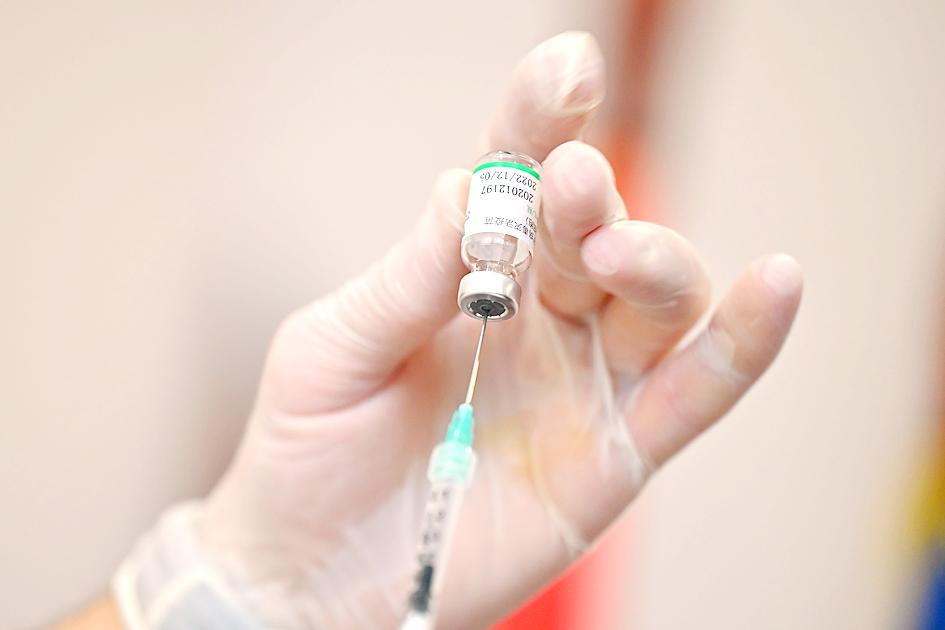The law prohibits Taiwan from importing vaccines made in China and no scientific evidence has shown Chinese COVID-19 vaccines to be highly effective, Minister of Health and Welfare Chen Shih-chung (陳時中) said yesterday.
Chen, who heads the Central Epidemic Command Center (CECC), made the remarks in response to media inquiries about an interview given by Taipei Mayor Ko Wen-je (柯文哲), which was published online on Friday.
In the interview, Ko said that he expects political squabbles in March to center around Taiwan being unable to secure COVID-19 vaccines from the UK or the US, but having anxiety and debate over whether to accept vaccines from China, if Beijing offered them to Taiwan for free.

Photo: AFP
Ko added his prediction is that the COVID-19 situation will ease in August.
Asked to elaborate, Ko on Friday afternoon said that more than 20 percent of Israel’s population has been vaccinated, so it might become the first country to exit the COVID-19 pandemic.
Most vaccines remain in developed countries, so Taiwan would feel pressured when many countries begin vaccination programs by March, Ko said.
At the CECC’s daily briefing yesterday, Chen said that laws in Taiwan stipulate that it cannot import vaccines made in China.
“The effectiveness of Chinese [COVID-19] vaccines don’t seem to be particularly good,” Chen said, adding that no published technical reports or research papers have proven their effectiveness.
“From a legal perspective and a practical perspective, Chinese vaccines are not an option for us,” Chen said.
The center would continue to work on vaccine procurement and domestic vaccine development, he said, adding that people do not need to trouble each other over whether they should get a Chinese vaccine.
“If anyone thinks we should import Chinese vaccines, they can propose to amend the law, and can present scientific evidence proving that the vaccines are highly effective so that it can be discussed further,” Chen said.
Separately yesterday, Premier Su Tseng-chang (蘇貞昌) said that the government has confidence in its vaccine procurement and has purchased a certain number of doses.
Development of a domestic vaccine has also made some progress, so people do not need to worry, Su said.

A preclearance service to facilitate entry for people traveling to select airports in Japan would be available from Thursday next week to Feb. 25 at Taiwan Taoyuan International Airport, Taoyuan International Airport Corp (TIAC) said on Tuesday. The service was first made available to Taiwanese travelers throughout the winter vacation of 2024 and during the Lunar New Year holiday. In addition to flights to the Japanese cities of Hakodate, Asahikawa, Akita, Sendai, Niigata, Okayama, Takamatsu, Kumamoto and Kagoshima, the service would be available to travelers to Kobe and Oita. The service can be accessed by passengers of 15 flight routes operated by

Alain Robert, known as the "French Spider-Man," praised Alex Honnold as exceptionally well-prepared after the US climber completed a free solo ascent of Taipei 101 yesterday. Robert said Honnold's ascent of the 508m-tall skyscraper in just more than one-and-a-half hours without using safety ropes or equipment was a remarkable achievement. "This is my life," he said in an interview conducted in French, adding that he liked the feeling of being "on the edge of danger." The 63-year-old Frenchman climbed Taipei 101 using ropes in December 2004, taking about four hours to reach the top. On a one-to-10 scale of difficulty, Robert said Taipei 101

Taiwanese and US defense groups are collaborating to introduce deployable, semi-autonomous manufacturing systems for drones and components in a boost to the nation’s supply chain resilience. Taiwan’s G-Tech Optroelectronics Corp subsidiary GTOC and the US’ Aerkomm Inc on Friday announced an agreement with fellow US-based Firestorm Lab to adopt the latter’s xCell, a technology featuring 3D printers fitted in 6.1m container units. The systems enable aerial platforms and parts to be produced in high volumes from dispersed nodes capable of rapid redeployment, to minimize the risk of enemy strikes and to meet field requirements, they said. Firestorm chief technology officer Ian Muceus said

MORE FALL: An investigation into one of Xi’s key cronies, part of a broader ‘anti-corruption’ drive, indicates that he might have a deep distrust in the military, an expert said China’s latest military purge underscores systemic risks in its shift from collective leadership to sole rule under Chinese President Xi Jinping (習近平), and could disrupt its chain of command and military capabilities, a national security official said yesterday. If decisionmaking within the Chinese Communist Party has become “irrational” under one-man rule, the Taiwan Strait and the regional situation must be approached with extreme caution, given unforeseen risks, they added. The anonymous official made the remarks as China’s Central Military Commission Vice Chairman Zhang Youxia (張又俠) and Joint Staff Department Chief of Staff Liu Zhenli (劉振立) were reportedly being investigated for suspected “serious